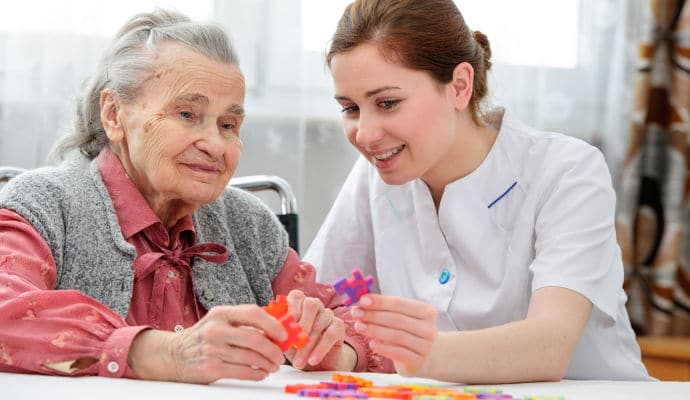Developing a Safe and Helpful Setting for Alzheimer's Care
The creation of a supportive and secure environment for people with Alzheimer's is critical in boosting their quality of life. This involves not just physical adaptations within the home, such as lessening hazards and including familiar components, however additionally the application of organized routines and significant activities that accommodate their cognitive needs. Understanding the emotional and psychological measurements of treatment can considerably affect their feeling of security and connection. Exploring these multifaceted approaches can disclose essential understandings right into effective caregiving methods that may transform the everyday experiences of both caretakers and people.
Comprehending Alzheimer's Needs
Regularly, people with Alzheimer's condition show a series of demands that require tailored approaches to care. As the condition proceeds, cognitive decrease materializes in various ways, influencing memory, thinking, and even the ability to perform everyday activities. Caregivers must identify these advancing requirements to offer suitable support and make certain a greater high quality of life for those affected.
One critical facet of recognizing Alzheimer's requirements is recognizing the relevance of regular and knowledge. People typically find convenience in well established patterns, which can decrease stress and anxiety and confusion. Caretakers must strive to develop structured everyday schedules that include significant activities lined up with the person's rate of interests and abilities.
In addition, efficient interaction is critical. Individuals with Alzheimer's might struggle to share themselves or comprehend complex language. Caretakers ought to utilize straightforward, clear language, use non-verbal signs, and practice energetic paying attention to promote understanding and link.
Caretakers should motivate interaction in neighborhood tasks or family members gatherings, promoting a sense of belonging and function. Comprehending these varied demands is essential for creating a helpful care atmosphere.
Designing a Safe Home
Producing a secure home for individuals with Alzheimer's illness is necessary to minimizing risks and promoting self-reliance. Ensure that pathways are clear and well-lit, as correct illumination minimizes disorientation and boosts movement.
Including flexible functions is likewise essential. Install grab bars in washrooms and near stairs, and consider making use of non-slip mats in wet areas. Furthermore, utilizing contrasting colors for floors and wall surfaces can aid in distinguishing rooms, helping to reduce complication.
Experience is necessary for people with Alzheimer's. Individualizing the setting with familiar things and pictures can reinforce a feeling of belonging and safety and security - Alzheimers Care Charlotte. It is likewise advantageous to have a designated area for daily activities, such as reading or crafting, which can supply structure to their day
Lastly, executing a safe outside space enables risk-free exploration while getting in touch with nature. By attentively developing the home setting, caregivers can significantly boost the quality of life for individuals dealing with Alzheimer's condition.
Enhancing Communication Abilities

Non-verbal communication, including facial expressions, gestures, and touch, plays a critical function in communicating empathy and understanding. Maintaining eye get in touch with and a calm temperament can enhance the comfort level of the individual, promoting a sense of safety.
In addition, it is very important to practice active listening. This entails being completely present, revealing perseverance, and permitting the person to share themselves without disruption. Rep may be necessary; caretakers should be prepared to review concerns or topics, as people with Alzheimer's might battle with memory recall.
Furthermore, making use of visual help or hints, such as pictures or familiar things, can help with recognition and engagement. Inevitably, improving interaction skills has to do with constructing trust and developing an atmosphere where individuals feel heard, valued, and understood, thereby enriching their lifestyle.
Motivating Social Communication
Cultivating purposeful social interactions can significantly enhance the wellness of people with Alzheimer's condition. have a peek at these guys Engaging with others not just aids fight feelings of seclusion yet also boosts cognitive function and emotional health and wellness. Structured social tasks, such as group crafts, video games and arts, or music therapy, produce chances for residents to get in touch with peers and caretakers, which read here can bring about boosted mood and reduced stress and anxiety.
Producing an inviting setting that urges socializing is essential. This can be accomplished by preparing public rooms that help with interaction, such as relaxing seating areas or task areas. In addition, including culturally pertinent and acquainted activities can spark memories and urge involvement, allowing people with Alzheimer's to really feel more linked to their past experiences.
Moreover, caregivers ought to be educated to acknowledge and promote social engagement amongst citizens. By prioritizing social communication, we can substantially enrich the lives of those living with Alzheimer's, fostering a feeling of area and belonging.
Supporting Caretaker Wellness

To sustain caregivers, organizations should offer normal training and academic resources to boost their understanding of Alzheimer's disease and caregiving techniques. Supplying accessibility to respite treatment services permits caregivers to take required breaks, reducing tension and fatigue - Alzheimers Care Charlotte. Furthermore, fostering a community with support groups can promote psychological sharing and the exchange of practical advice amongst caretakers, creating a network of common assistance
Psychological health and wellness resources, such as therapy services, can also be vital in dealing with the psychological toll caregiving can take. By focusing on caregiver wellness, we create a more lasting caregiving environment that not only profits the caretakers themselves however also enhances the total high quality of treatment obtained by people with Alzheimer's. Inevitably, supporting caregivers is an important component in try here fostering a thoughtful and effective treatment setup.
Conclusion
To conclude, the development of a risk-free and encouraging atmosphere for people with Alzheimer's is important to improving their lifestyle. By focusing on safety via thoughtful design, fostering psychological well-being with familiar elements, and promoting interaction with structured regimens, caregivers can significantly affect the overall experience of those affected by this problem. In addition, supporting caretaker wellness is critical, as it ultimately contributes to a much more effective and compassionate care setting.
Repetition may be necessary; caretakers ought to be prepared to revisit concerns or subjects, as people with Alzheimer's may struggle with memory recall.
